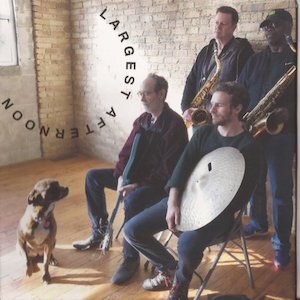Label: Mahakala Music, 2025
Personnel - Ivo Perelman: tenor saxophone; Ken Vandermark: baritone saxophone; Joe McPhee: trombone.
On his latest album, Oxygen, the thrill-seeking tenor saxophonist Ivo Perelman joins forces with two other icons of improvisation: the versatile saxophonist Ken Vandermark, who plays exclusively baritone saxophone here, and multi-instrumentalist Joe McPhee, who sticks to the trombone. While Perelman has collaborated with both musicians in duo settings—featured on the 2022 album Reed Rapture in Brooklyn—this marks their first time performing together as a trio. As expected, the album brims with ideas, bursting with spontaneous rhythmic cadences within open structures.
Their freely improvised exchanges unfold with a measured breathing mechanism in “Oxygen”, incorporating freewheeling tenor explorations, a baritone-driven pedal pulse, and a simple trombone riff that expands into vicious growls. Perelman’s deliberate musings are periodically punctuated by Vandermark’s popping baritone tones and McPhee’s airy trombone turbulence, creating a fascinating interplay of timbres. Magnetic loops and sustained drones are frequently employed, reaching a striking peak in “Nitrogen”, where saxophone multiphonics take part in a noncombustible combination of elements.
“Carbon” receives a distinct percussive treatment from the outset, with Vandermark shaping his baritone phrases with strong narrative focus and a commitment to swift circular motions. Perelman, uninhibited in his creative approach, engages in fiery interplay with McPhee’s commanding brass surges, eventually leading the trio into a cacophonous climax before settling back into chamber-like introspection. “Sulfur” absolutely stuns, incorporating vocals in a ritualistic prayer. The musicians fully embrace their experimental instincts here, transforming the piece into an electrified, pulse-driven dance that, recalling electronic music, urges the body to move freely. Yet, amid the storm, moments of melodic convergence emerge—a celestial buzzing followed by shadowy, suspenseful tones.
The absence of harmonic instruments makes the improvisational terrain more demanding but immensely rewarding, with melodic lines veering into unexpected tangents and dynamic intersections. Perelman, Vandermark, and McPhee are masters of spontaneous dialogue, responding to one another with uncanny intuition and an unwavering sense of trust.
Favorite Tracks:
01 - Oxygen ► 02 - Carbon ► 03 - Sulfur










